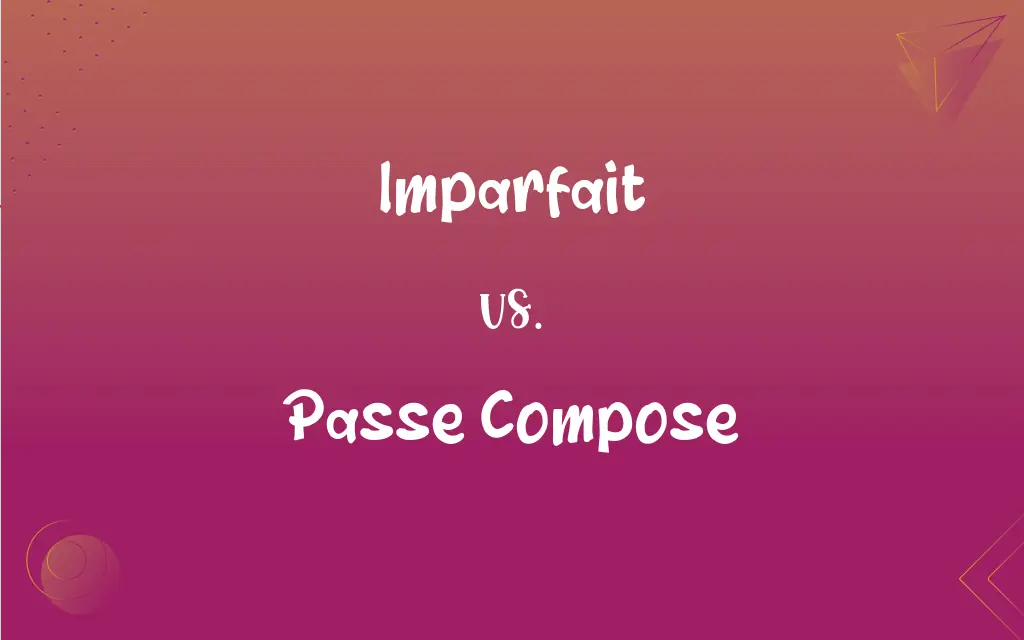Imparfait vs. Passe Compose: What's the Difference?
Edited by Aimie Carlson || By Janet White || Published on October 2, 2024
Imparfait is a French past tense used for ongoing or habitual past actions, while Passé Composé indicates completed actions or specific events in the past.

Key Differences
Imparfait is used to describe background details, habits, or ongoing states in the past. Passé Composé is used to narrate specific events or actions that have been completed.
Imparfait indicates an action without a specified beginning or end in the past. Passé Composé denotes actions that have a clear start and finish in the past.
Imparfait is formed using the present tense stem of the first person plural (nous) form and adding -ais, -ais, -ait, -ions, -iez, -aient. Passé Composé is formed with the auxiliary verbs être or avoir in the present tense, plus the past participle of the main verb.
Imparfait is used for setting the scene like "Il faisait beau" (It was nice weather). Passé Composé is used for main actions or events such as "J'ai mangé" (I ate).
Imparfait is often used to describe habitual actions in the past ("Je lisais souvent" - I often read). Passé Composé indicates actions completed at a specific time ("J'ai lu hier" - I read yesterday).
ADVERTISEMENT
Comparison Chart
Use
Ongoing, habitual actions
Completed, specific events
Time Aspect
Actions without clear start/end
Actions with a clear start/end
Formation
Present tense stem of ‘nous’ + -ais, -ais, -ait, etc.
Auxiliary verb (être/avoir) + past participle
Contextual Example
Setting the scene
Main actions or events
Describing Frequency
Habitual actions in the past
Specific occurrences
ADVERTISEMENT
Imparfait and Passe Compose Definitions
Imparfait
Imparfait expresses repeated or habitual past actions.
Nous allions souvent au marché (We often went to the market).
Passe Compose
Passé Composé is used for actions that have a direct impact on the present.
Tu as oublié tes clés (You forgot your keys).
Imparfait
Imparfait is used for background details in a narrative.
Elle portait une robe bleue (She was wearing a blue dress).
Passe Compose
Passé Composé is formed with an auxiliary verb and a past participle.
Elle a acheté une voiture (She bought a car).
Imparfait
Imparfait describes ongoing or habitual actions in the past.
Je regardais la télévision chaque soir (I watched TV every evening).
Passe Compose
Passé Composé indicates specific events or main actions.
Il a plu hier (It rained yesterday).
Imparfait
Imparfait is used for setting a scene or describing states in the past.
Il était tard et il pleuvait (It was late and it was raining).
Passe Compose
Passé Composé is used for completed actions in the past.
J'ai fini mes devoirs (I finished my homework).
Imparfait
Imparfait indicates actions with no specified beginning or end in the past.
Quand j'étais jeune, je jouais au football (When I was young, I played football).
Passe Compose
Passé Composé describes actions with a clear start and end.
Nous avons vu un film (We watched a movie).
FAQs
What is Imparfait used for in French?
Imparfait is used for ongoing, habitual actions or to set the scene in the past.
What does Passé Composé indicate?
Passé Composé indicates completed actions or specific events in the past.
Can Imparfait and Passé Composé be used together?
Yes, they often appear together in narratives, with Imparfait providing background and Passé Composé detailing specific actions.
How do you form Passé Composé?
Passé Composé is formed with the auxiliary verbs être or avoir and the past participle of the main verb.
What are examples of verbs typically used in Imparfait?
Verbs like être (was/were), avoir (had), faire (did/made) are often used in Imparfait.
Is Passé Composé used for sudden events in the past?
Yes, Passé Composé is ideal for expressing sudden or one-time events in the past.
Is Imparfait used for habits?
Yes, Imparfait is used to describe habitual actions in the past.
How do you choose between Imparfait and Passé Composé?
The choice depends on whether the action is ongoing/habitual (Imparfait) or completed/specific (Passé Composé).
Are weather descriptions in Imparfait or Passé Composé?
Weather descriptions are typically in Imparfait, as they set the scene.
How is Imparfait formed?
Imparfait is formed using the ‘nous’ form of the present tense and adding endings like -ais, -ait.
Is Imparfait used for actions without a clear endpoint?
Yes, Imparfait is used for actions without a specified beginning or end.
Can Passé Composé be used for a series of completed actions?
Yes, Passé Composé is used to list a series of completed actions.
How do adverbs influence the use of Imparfait or Passé Composé?
Adverbs like 'toujours' (always) suggest Imparfait, while 'une fois' (once) suggests Passé Composé.
Is the auxiliary verb 'être' used in Passé Composé for all verbs?
No, 'être' is used as an auxiliary in Passé Composé for certain verbs, mainly those involving movement or change of state.
Can the same action be described by both tenses?
Yes, depending on the context and aspect of the action being described.
Does Imparfait imply the action might continue?
Yes, Imparfait often implies that the action could continue or was part of a regular pattern.
Does Passé Composé focus on the duration of an action?
No, Passé Composé focuses on the completion of an action, not its duration.
Does Passé Composé have a direct impact on the present?
Often, Passé Composé is used for actions that have immediate relevance or impact on the present.
Do feelings or states of being use Imparfait or Passé Composé?
Feelings or states of being typically use Imparfait.
Are there irregular forms in Imparfait and Passé Composé?
Yes, both tenses have irregular forms, particularly in the past participles used in Passé Composé.
About Author
Written by
Janet WhiteJanet White has been an esteemed writer and blogger for Difference Wiki. Holding a Master's degree in Science and Medical Journalism from the prestigious Boston University, she has consistently demonstrated her expertise and passion for her field. When she's not immersed in her work, Janet relishes her time exercising, delving into a good book, and cherishing moments with friends and family.
Edited by
Aimie CarlsonAimie Carlson, holding a master's degree in English literature, is a fervent English language enthusiast. She lends her writing talents to Difference Wiki, a prominent website that specializes in comparisons, offering readers insightful analyses that both captivate and inform.






































































